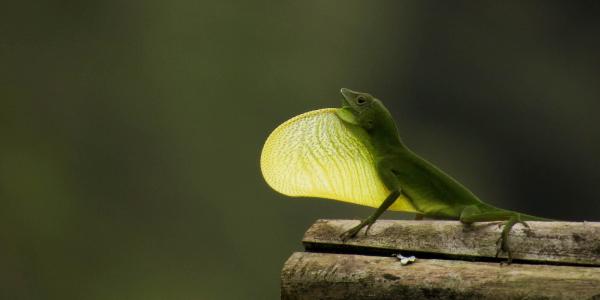The Colombia native has made high-impact — and high-altitude — discoveries about the adaptations of lizards in his home country.
Jhan Carlos Salazar has climbed great heights in his six years as a graduate student at WashU. Working with Jonathan Losos, the William H. Danforth Distinguished University Professor and director of the Living Earth Collaborative, Salazar studies mountains as incubators for evolution and bastions of biodiversity. His work centers on the Andes, a mountain range near his hometown of Puerto Tejada, Colombia.

“The Andes are one of the most biodiverse regions of the planet,” Salazar said. “I want to remind people in my home country of what they have and what they need to protect.”
Salazar, a finalist for the 2024 Dean’s Award for Graduate Research Excellence and one of six recipients of the 2024 Provost's Graduate Student Research Excellence Award, grew up in a small town in the foothills of the Andes. His parents made a meager living running a small shop in Cali, and no one in his family attended college. Even though he spent his childhood less than an hour’s drive from the Andes, he never appreciated the liveliness of the region until he visited his grandmother’s house at the edge of the forest as an 11-year-old. “There were so many frogs, snakes, and birds,” he said. “It was like watching the Discovery Channel.”
Inspired by the nature close to home, Salazar studied biology and conservation as an undergraduate at Icesi University in Cali, Colombia. As part of his studies, he pored over “The Princeton Guide to Evolution,” a textbook edited by Losos. “I couldn’t afford my own copy, so I had to borrow it from the library,” he said.
While still an undergraduate, Salazar developed a research project on the evolution and diversity of anole lizards, colorful reptiles that inhabit much of the tropical world, including the forests of Colombia. When it was time to apply to graduate school, he sent an email asking to team up with Losos, a preeminent expert on anole evolution who had just moved from Harvard to WashU. It was a natural fit. “I was delighted when Jhan contacted me,” Losos said. “We’re fortunate he chose us.”

Salazar joined Losos’s group in 2019, starting an enduring and productive partnership that highlighted the important role of mountains as drivers of evolution. In 2022, Salazar spent seven weeks tracking lizards in the mountain forests near his hometown, taking a few extra moments to appreciate the area’s toucans and spider monkeys.
Using a combination of field data, computational biology, and genomic investigations, Salazar showed that various species of lizards have become well-adapted to the differences in climate between the lowlands and the mountain peaks. “Lizards at high elevations have more tolerance for cold and less tolerance for heat,” he said. Such adaptations have helped lizards thrive at their preferred altitudes, but Salazar believes some species could be especially vulnerable to rising temperatures that come with climate change.

At every step of his research, Salazar followed his own scientific instincts and developed his own approaches to problems, from figuring out how to measure the body temperature of lizards to finding the best statistical approaches for data. “Jhan has been the driving force behind this project,” Losos said. “His interdisciplinary approach has already helped him stand out. His future is very bright.”
As his time at WashU comes to a close, Salazar is thinking about his next move. He is planning to take a postdoctoral position with the Mayo Clinic in Jacksonville, Florida, where he would contribute to LatinCells, a project that aims to map cellular diversity among Latin Americans. “I want to apply what I’ve learned about genes to human evolution,” he said. “I especially want to study the genomes of indigenous populations of South America.”
Wherever he lands next, he'll keep at least one souvenir from his time in St. Louis: His very own copy of that evolution textbook, signed by the editor.
Header image: Anolis princeps (Photo: Jhan Carlos Salazar)





